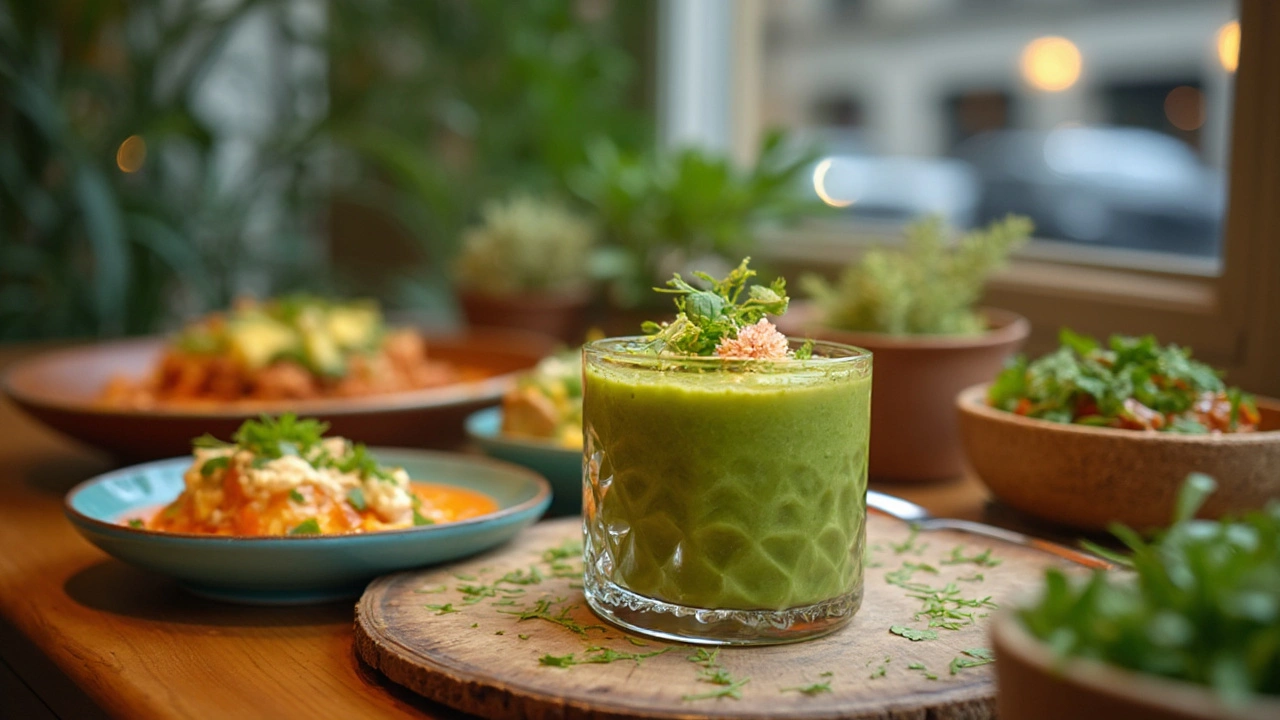You might know coriander as that leafy green thing on your taco, but this herb is a real health powerhouse! Whether fresh or in seed form, it's packed with goodness. We often overlook it because cilantro (that's what our American friends call it) tends to pop up just for a bit of color. Yet, there's so much more to it. This tiny leaf does a mighty job of supporting our health.
For starters, coriander is a great detox buddy for your body. It helps reduce heavy metals, making you feel lighter and energized. We could all use a bit of that, right? And if you’re tired of those pesky digestive issues, coriander is here to be your gut's new best friend, helping everything work smoothly down there.
Not sure how to use it beyond sprinkling it on a curry? No worries, we’ve got tips to seamlessly add it to your daily meals. You're going to love how easy it is! Plus, it's a keeper with health perks like improved skin and even lower blood sugar levels. So, why not give it a go and see how a sprinkle of this green wonder can change your meal game?
- What Makes Coriander a Superfood?
- Health Benefits of Coriander
- Incorporating Coriander into Your Diet
- Coriander Tips and Tricks
- Safety and Dosage Considerations
What Makes Coriander a Superfood?
So, you might be wondering, why is coriander considered a superfood? Well, it’s not just about the flavor. Coriander is loaded with nutrients that are beneficial for your overall health.
Coriander’s Nutritional Value
First off, coriander is rich in antioxidants. These little guys help protect your cells from damage—kind of like little bodyguards for your body. The antioxidants found in coriander can reduce inflammation and have been linked to improving heart health.
Besides that, coriander is a great source of important vitamins and minerals. It's particularly high in vitamin K, which helps with blood clotting and bone health. Seriously, it's like a small but mighty force in your diet.
The Versatile Herb
No matter how you slice it, coriander is versatile. You can use fresh leaves (often called cilantro) or the dried seeds. Both forms bring their own unique set of benefits. Fresh coriander is fantastic for supporting digestion, while the seeds tend to help regulate blood sugar levels, which is big if you’re watching your sugar intake.
| Nutrient | Percentage of Daily Value |
|---|---|
| Vitamin K | 109% |
| Vitamin C | 13% |
| Potassium | 4% |
See, it's more than decoration on your plate! With all these nutrients packed into each leaf and seed, no wonder it’s dubbed a superfood. Incorporating coriander into your meals could be an easy step towards a healthier lifestyle.
And not to mention, the benefits don't stop there. Folks love it for its potential anti-bacterial properties, too, keeping unwanted guests (read: germs) at bay. With a resume like this, coriander’s seat at your next meal is well-deserved!
Health Benefits of Coriander
When it comes to packing a punch, coriander is in a league of its own. Let's dive into why this humble herb deserves a spot in your daily routine.
Boosting Your Digestion
Struggling with digestion? Consider coriander your new best friend. It's known for promoting a healthy gut. The herb helps reduce bloating and discomfort by improving overall digestion efficiency.
Battling Inflammation
Chronic inflammation can be a real hassle, leading to various health issues. Lucky for you, coriander has powerful anti-inflammatory properties, thanks to its rich array of antioxidants. Including it in your diet might just help ease that pesky inflammation.
Regulating Blood Sugar Levels
Dealing with blood sugar spikes can be tough, but coriander might offer some relief. Studies have shown that it can help in managing blood sugar levels. It works by enhancing enzyme activity that processes sugars efficiently.
Nutrient-Dense and Detoxifying
Coriander is a nutrient powerhouse. It's brimming with vitamins like A, C, and K, and minerals such as potassium and magnesium. Plus, it's a great natural detox agent—it aids in the removal of heavy metals from the body, promoting overall wellness.
Supporting Heart Health
Taking care of your heart? Coriander might lend a hand by reducing LDL (that's the bad kind) cholesterol levels. Keeping cholesterol in check is crucial for a healthy heart, and this leafy little helper can contribute to that mission.
Nutritional Snapshot
Here's a quick look at what adding coriander to your diet can offer:
| Nutrient | Benefits |
|---|---|
| Vitamin A | Supports eye health and vision |
| Potassium | Helps regulate blood pressure |
| Vitamin C | Boosts the immune system |
In essence, coriander isn't just a pretty garnish—it's a superfood in its own right. With these amazing health benefits, it's clear why more folks are taking an interest in this vibrant green herb.

Incorporating Coriander into Your Diet
Getting more coriander in your meals is easier than you might think. It's a super versatile herb, fitting perfectly into many cuisines and dishes. Whether you're a master chef or just starting out in the kitchen, coriander can effortlessly boost your culinary game.
Simple Ways to Use Coriander
- Fresh Garnishing: The simplest way - just chop it up and sprinkle! Top your soups, curries, salads, or even scrambled eggs for a burst of flavor and color.
- Whip Up a Chutney: Blend fresh coriander leaves with garlic, green chilies, and a squeeze of lime to make a refreshing chutney. Great as a dip or to liven up sandwiches.
- Coriander Dressing: Mix finely chopped coriander with olive oil, lime juice, and a pinch of salt for a tangy salad dressing.
Cooking with Coriander Seeds
Don't skip coriander seeds! They're a great spice that adds layers to your dish's flavor profile.
- Spice Your Sauces: Grind them and add to sauces, marinades, or even burger patties for a unique taste.
- Roast Them: Gently roast coriander seeds on low heat to bring out an earthy aroma. They pair well with roasted vegetables or meats.
A fun fact to note—coriander has been traditionally used in various herbal remedies around the world. Its seeds contain essential oils that might support digestion, regulate cholesterol levels, and possibly even help support blood sugar management. So, adding coriander isn't just about flavor; it's doing your body some good too!
Try Something New
Explore different cultural dishes that heavily feature coriander. You could whip up some fragrant Indian tzatziki or a refreshing Middle Eastern tabbouleh, where coriander plays a starring role.
The commitment here isn't huge. A little coriander here and there goes a long way. Besides, it's super affordable, so it's a budget-friendly way to spice up meals while enjoying the health perks!
Coriander Tips and Tricks
Real quick—let's talk about how to get the most out of coriander. Here are some handy tips for those who want to make the most of this leafy superstar. Whether you're a kitchen newbie or a seasoned cook, these tricks will have you using coriander like a pro.
Shopping Smart
When buying fresh coriander, look for bright green leaves without any black spots or wilting. The fresher, the better! And here’s a tip: buy it whole. That means leaves, stems, and roots if you can find them. More on that next.
Maximizing Flavor
The stems and roots of coriander are flavor bombs. Don’t toss them out! Chop them finely and add to stir-fries, soups, or marinades. They’re great for adding a punch of flavor, especially in Thai dishes. Think of it as using the whole buffalo, or in this case, the whole herb.
Storage Strategies
- Store fresh coriander in a jar with water, just like you'd treat flowers. Cover the leaves with a plastic bag and keep it in the fridge. It can last up to a week this way!
- If you’ve got too much coriander, chop it up and freeze it in an ice cube tray with olive oil. Perfect for quick adds to any dish.
Cooking with Coriander
Use fresh coriander towards the end of cooking. Sprinkle it on curries or salads for that fresh, herbal kick. And if you’re using coriander seeds, toast them first to enhance their nutty flavor before grinding them for spice mixes.
Tab Over Coriander Benefits
Ever wondered what coriander brings to the table? Here’s a quick glance:
| Component | Benefit |
|---|---|
| Antioxidants | Fights free radicals |
| Vitamins | Boosts immune system |
| Fiber | Aids digestion |
Got a favorite way to use coriander? Share it with us! There’s always more to learn about this impressive herb. Happy cooking!

Safety and Dosage Considerations
While coriander is generally safe for most folks when used in cooking, there are a few things to keep in mind to get the most out of this superfood without any hiccups.
How Much is Too Much?
If you're diving into the world of coriander supplements or simply using it more heavily in your diet, moderation is key. A teaspoon of coriander seeds or a handful of fresh leaves in a meal is typically enough to enjoy its benefits without issues.
Going overboard might lead to some not-so-fun tummy troubles or, in rare cases, an allergic reaction, especially if you're new to using it extensively. If you notice any discomfort, it might be wise to ease up and see if it makes a difference.
Watch Out for Allergies
Coriander allergies do pop up once in a while. If you're allergic to plants in the parsley family, like carrots or celery, you might need to keep an eye on how you react to it. Symptoms can include rashes, trouble breathing, or itchiness.
Consulting Your Doc
If you're pregnant, breastfeeding, or on meds, a quick chat with your doctor won't hurt. They'll know if adding coriander as a dietary supplement will play nice with any treatments or conditions you have.
Know Your Limits
Coriander might lower blood sugar, which is awesome unless you're trying to manage it with medication. In such cases, monitoring levels regularly and adjusting coriander intake could be beneficial, with professional guidance, of course.
The takeaway? Enjoy coriander as part of your meals, but keep your body's responses in check and don't hesitate to seek advice if something feels off.


Ben Wyatt
If you’re looking for a simple way to boost nutrition, tossing a handful of fresh coriander into your meals can make a noticeable difference. The herb packs a punch of vitamin K, vitamin C, and antioxidants that help protect cells from oxidative stress. Research shows that the compounds in coriander can bind to heavy metals like lead and mercury, aiding the body’s natural detox processes. Incorporating the leaves at the end of cooking preserves those delicate nutrients, while the seeds work well when lightly toasted to release their earthy flavor. For digestive health, coriander stimulates bile production, which in turn improves the breakdown of fats and reduces bloating after meals. If you struggle with occasional blood sugar spikes, a teaspoon of ground coriander seed added to oatmeal or smoothies can help smooth out the glucose curve. The herb also contains modest amounts of potassium and magnesium, supporting heart rhythm and blood pressure regulation. When you store fresh coriander, treat it like a bouquet: trim the stems, place them in a jar of water, and cover the tops with a plastic bag in the fridge; this can keep the leaves vibrant for up to a week. If you have excess, chop the leaves, place them in ice‑cube trays with a splash of olive oil, and freeze; the cubes are perfect for quick flavor boosts in soups or stir‑fries. A quick homemade coriander‑lime dressing-mix chopped leaves, lime juice, a drizzle of olive oil, and a pinch of salt-adds a bright note to salads and grilled veggies. Remember that moderation is key; most people find that a handful of leaves or a teaspoon of seeds per day provides the benefits without any gastrointestinal upset. People with a known allergy to the Apiaceae family should test a small amount first, as rare reactions can include itching or mild stomach irritation. Pregnant or breastfeeding individuals should check with their healthcare provider before taking concentrated coriander supplements, though normal culinary use is generally safe. The flavor profile of coriander can vary by region-some varieties are more citrusy, while others lean toward a peppery note-so experiment with different sources to find your favorite. By making coriander a regular part of your cooking routine, you’ll enjoy both the taste upgrade and the subtle health perks that come from this unassuming green powerhouse.